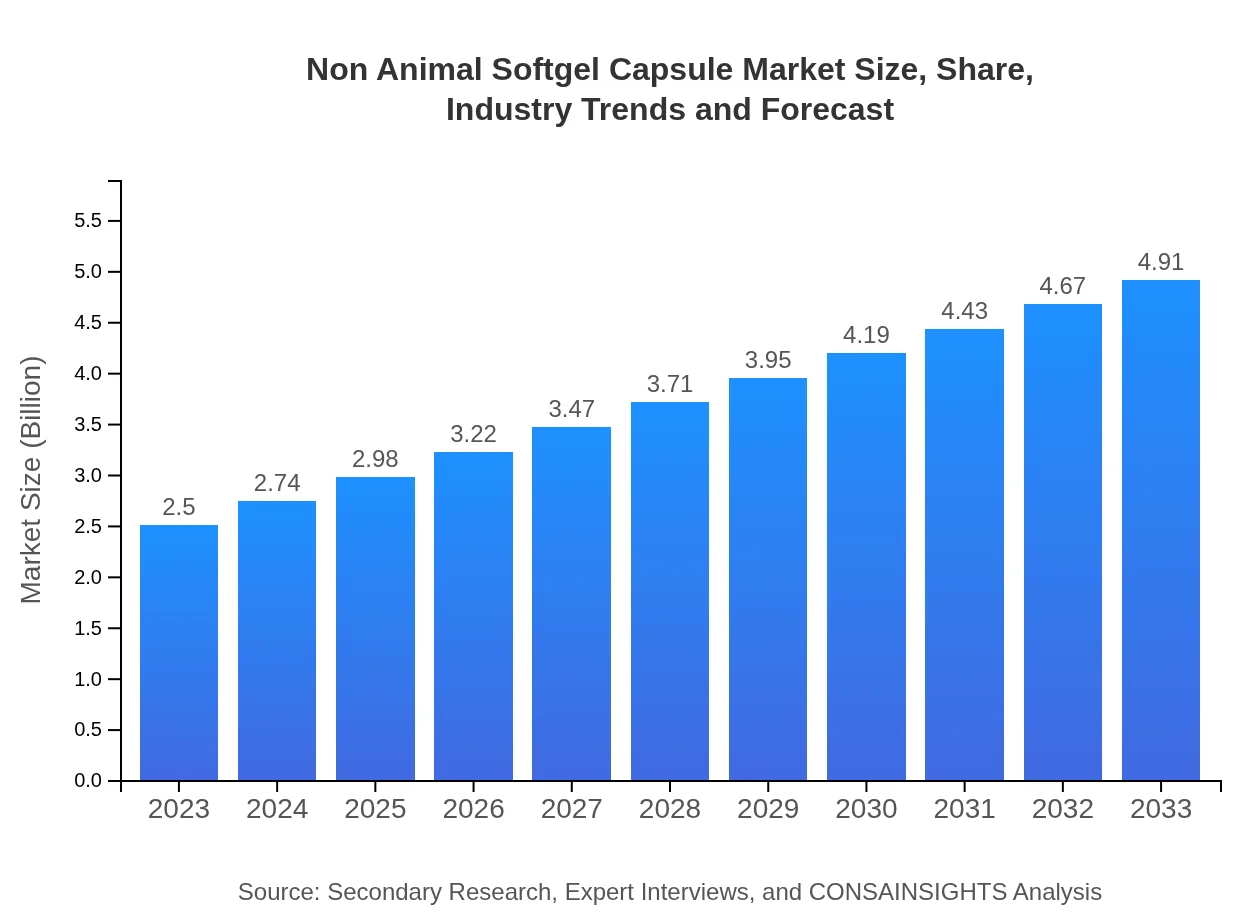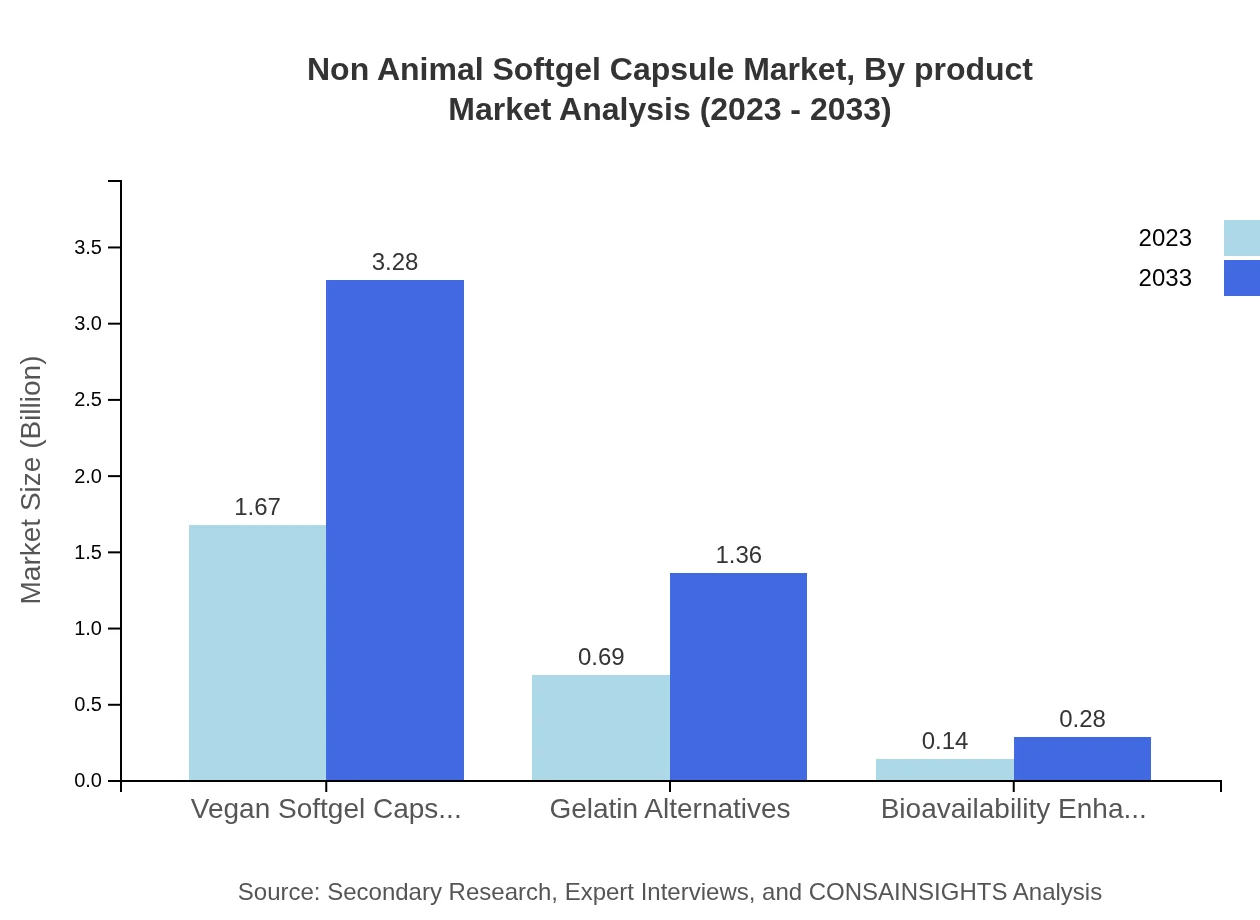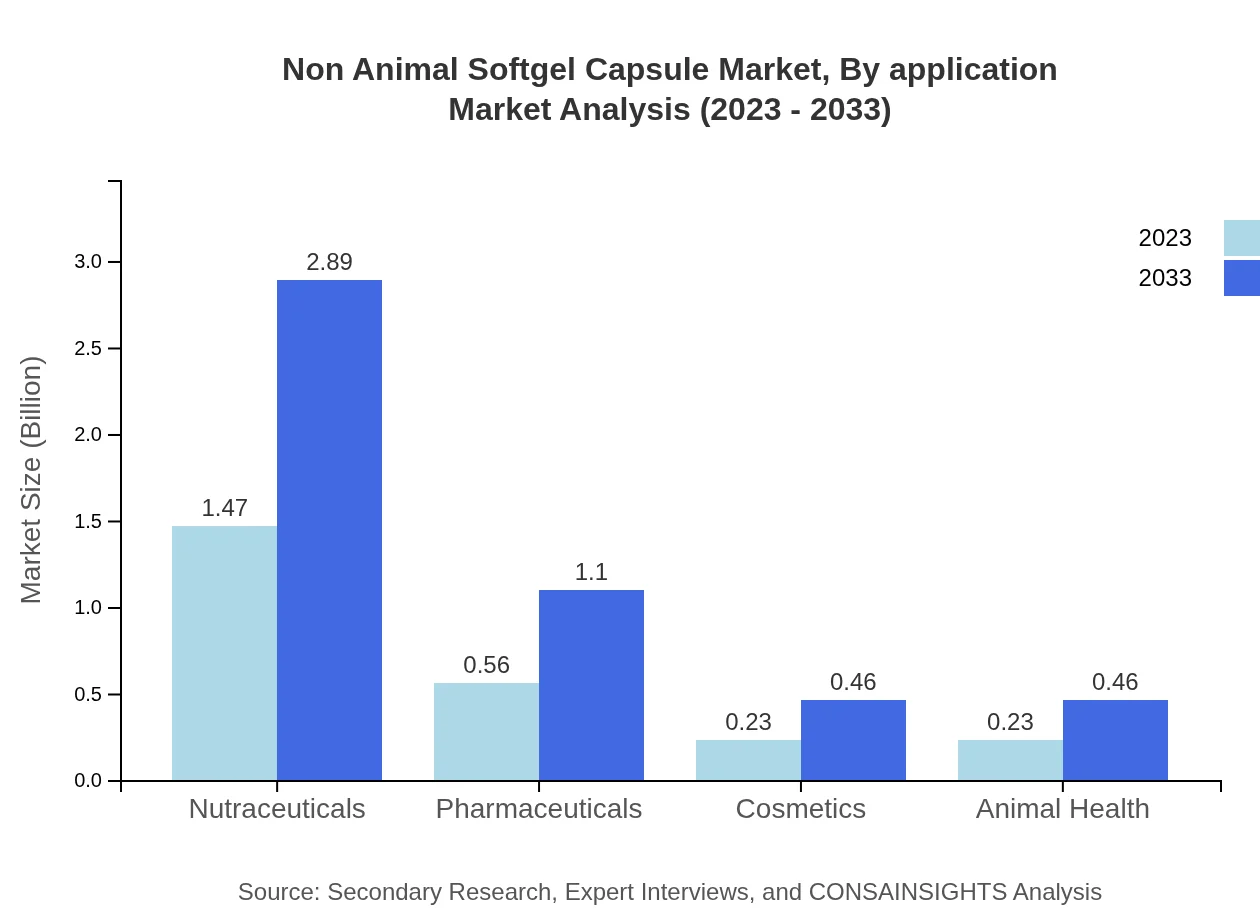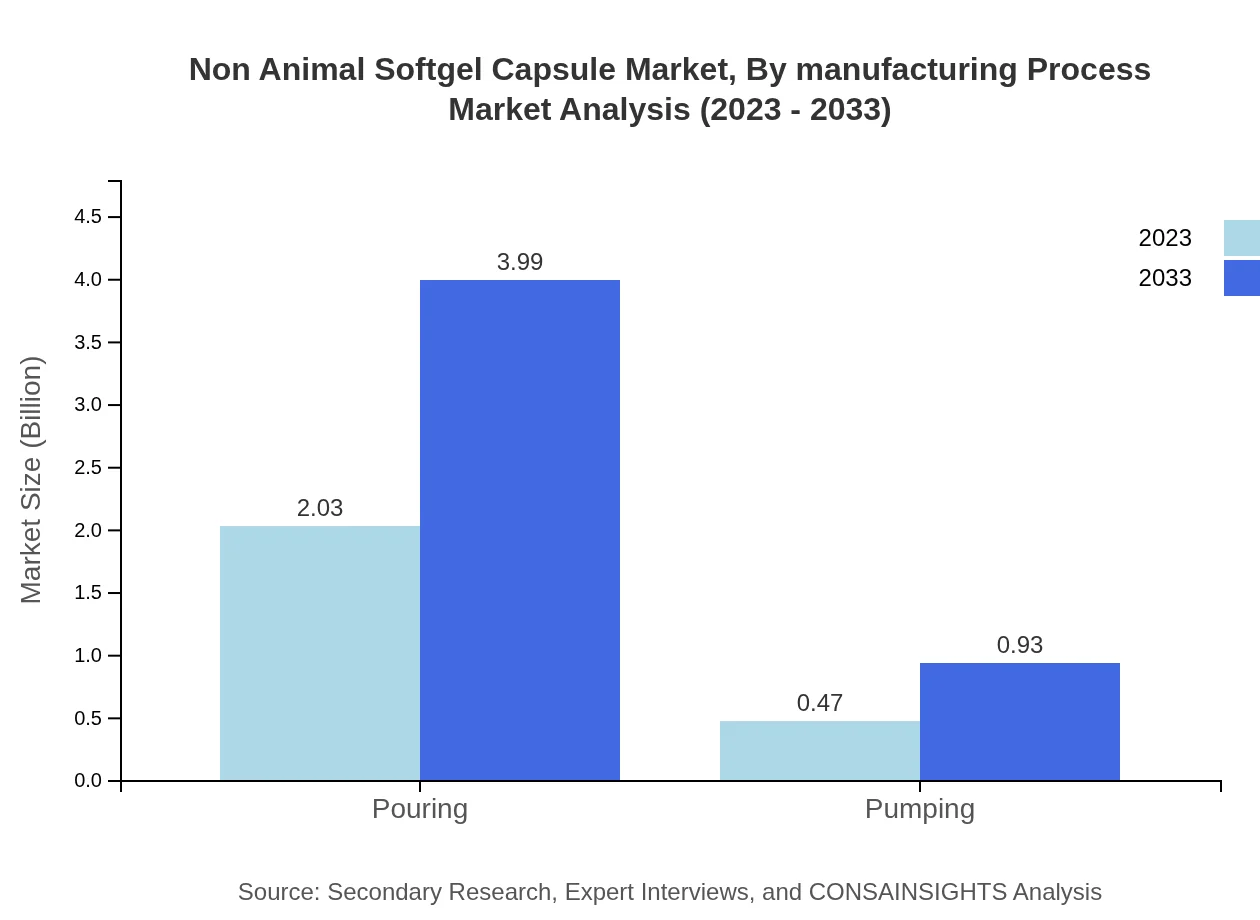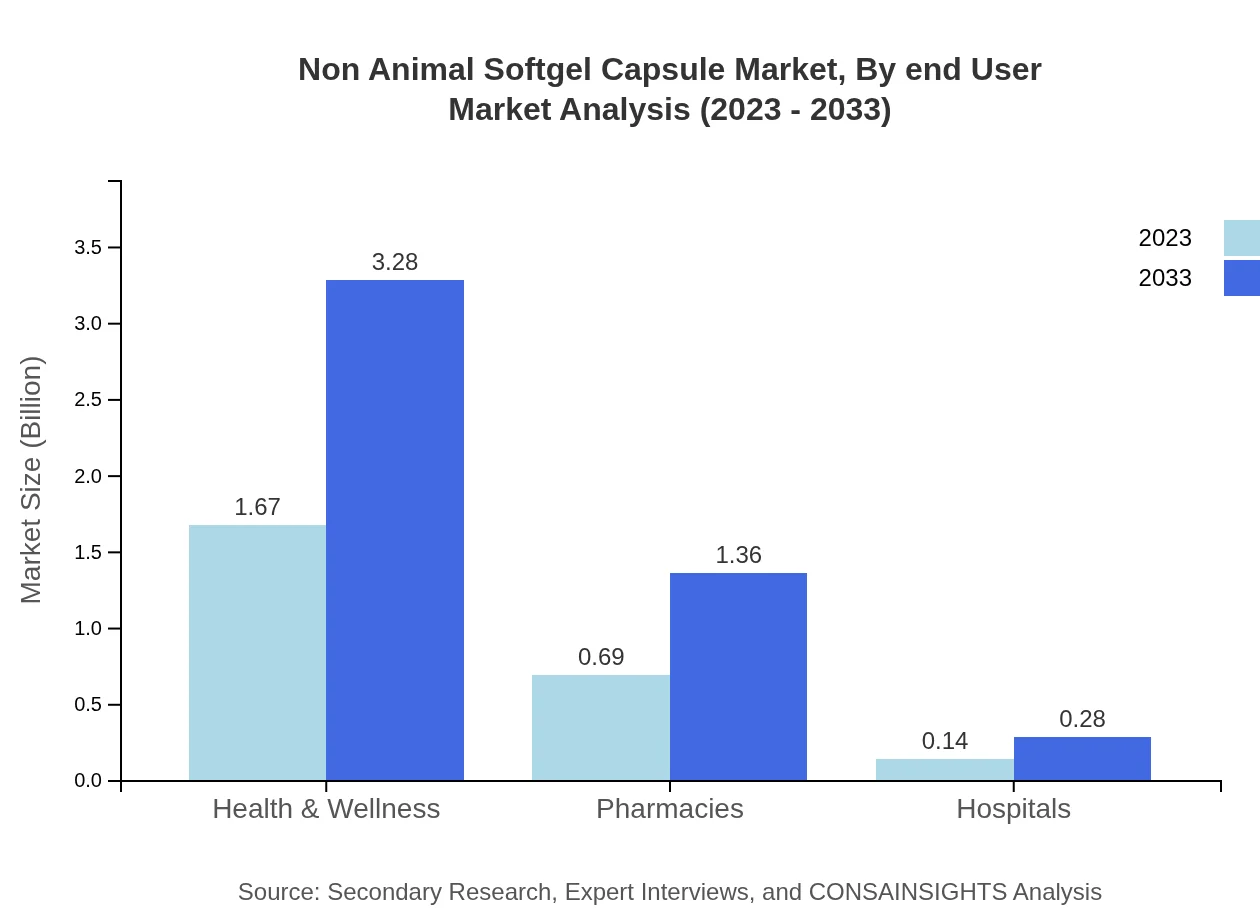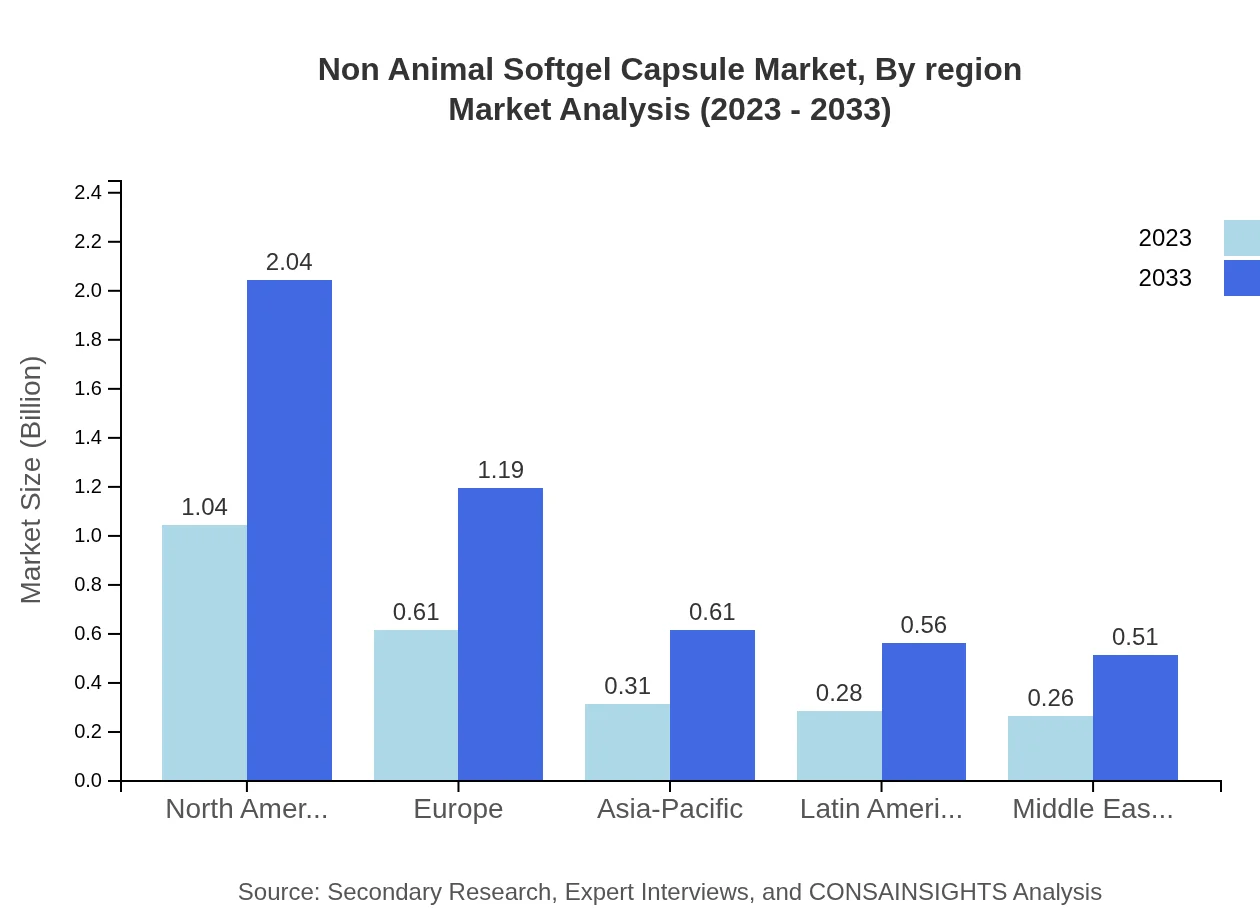Non Animal Softgel Capsule Market Report
Published Date: 31 January 2026 | Report Code: non-animal-softgel-capsule
Non Animal Softgel Capsule Market Size, Share, Industry Trends and Forecast to 2033
This report provides a comprehensive analysis of the Non Animal Softgel Capsule market. It covers market size, growth rates, trends, and forecasts from 2023 to 2033, delivering valuable insights into segments, regions, and technological advancements impacting the industry.
| Metric | Value |
|---|---|
| Study Period | 2023 - 2033 |
| 2023 Market Size | $2.50 Billion |
| CAGR (2023-2033) | 6.8% |
| 2033 Market Size | $4.91 Billion |
| Top Companies | Lonza Group AG, Catalent, Inc., Qualicaps |
| Last Modified Date | 31 January 2026 |
Non Animal Softgel Capsule Market Overview
Customize Non Animal Softgel Capsule Market Report market research report
- ✔ Get in-depth analysis of Non Animal Softgel Capsule market size, growth, and forecasts.
- ✔ Understand Non Animal Softgel Capsule's regional dynamics and industry-specific trends.
- ✔ Identify potential applications, end-user demand, and growth segments in Non Animal Softgel Capsule
What is the Market Size & CAGR of Non Animal Softgel Capsule market in 2023?
Non Animal Softgel Capsule Industry Analysis
Non Animal Softgel Capsule Market Segmentation and Scope
Tell us your focus area and get a customized research report.
Non Animal Softgel Capsule Market Analysis Report by Region
Europe Non Animal Softgel Capsule Market Report:
Europe presents a mature market, with the value of Non Animal Softgel Capsules anticipated to rise from $0.85 billion in 2023 to $1.67 billion in 2033, bolstered by stringent regulations favoring plant-based products and a broad consumer shift towards health-conscious shopping behaviors.Asia Pacific Non Animal Softgel Capsule Market Report:
In the Asia Pacific region, the Non Animal Softgel Capsule market is forecasted to grow from $0.47 billion in 2023 to $0.93 billion by 2033, driven by the increasing health awareness and the rising trend of vegetarian and vegan diets. Consumer demand for functional foods is also on the rise, increasing the need for alternative delivery systems for supplements.North America Non Animal Softgel Capsule Market Report:
In North America, the market size in 2023 is estimated at $0.81 billion, expanding to $1.59 billion by 2033, reflecting robust growth fueled by strong demand for dietary supplements and a decisive shift towards vegan products. Here, consumers are more inclined to choose non-animal derived capsules, impacting manufacturers' formulation strategies.South America Non Animal Softgel Capsule Market Report:
The South American market is relatively smaller, with a size of $0.09 billion in 2023, projected to reach $0.17 billion by 2033. The growth is supported by rising disposable incomes and increased expenditure on health and wellness products, particularly among younger demographics.Middle East & Africa Non Animal Softgel Capsule Market Report:
The Middle East and Africa market is expected to grow from $0.28 billion in 2023 to $0.55 billion by 2033 due to increasing health awareness and improvements in healthcare infrastructure. The demand for herbal and dietary supplements is particularly on the rise, aligning with global health and wellness trends.Tell us your focus area and get a customized research report.
Non Animal Softgel Capsule Market Analysis By Product
The product segment encompasses Vegan Softgel Capsules, Gelatin Alternatives, and Bioavailability Enhancers. The Vegan Softgel Capsules market holds a significant share, accounting for approximately 66.67% of the total, with expected growth from $1.67 billion in 2023 to $3.28 billion by 2033. Gelatin Alternatives are also gaining traction, representing around 27.72% and anticipated growth of $0.69 billion to $1.36 billion, reflecting consumer preferences for health-compliant options.
Non Animal Softgel Capsule Market Analysis By Application
In terms of applications, Nutraceuticals dominate the sector with a market share of 58.88%, expected to grow significantly from $1.47 billion in 2023 to $2.89 billion by 2033. Pharmaceuticals and Health & Wellness applications are also substantial contributors, signaling robust demand across all fronts with industry players focusing on innovative product offerings.
Non Animal Softgel Capsule Market Analysis By Manufacturing Process
The manufacturing processes include pouring and pumping methodologies. The pouring process controls over 81.14% of the market, reinforcing its prevalence in production capabilities. Growth in this sector is driven by advances in manufacturing efficiency and technology.
Non Animal Softgel Capsule Market Analysis By End User
End-users include Pharmacies, Hospitals, and Health & Wellness retailers. Pharmacies are expected to grow from $0.69 billion in 2023 to $1.36 billion by 2033, making them a pivotal distribution channel for non-animal softgel capsules.
Non Animal Softgel Capsule Market Analysis By Region
Regional analysis highlights strong demands in all regions. North America leads in market value and share, while Europe also shows significant growth potential. Asia Pacific is emerging as an important market driven by health consciousness and dietary shifts.
Non Animal Softgel Capsule Market Trends and Future Forecast
Tell us your focus area and get a customized research report.
Global Market Leaders and Top Companies in Non Animal Softgel Capsule Industry
Lonza Group AG:
Lonza Group is renowned for its manufacturing capabilities in non-animal capsules, catering primarily to the pharmaceutical and nutraceutical sectors. Their focus on sustainability and innovation has propelled them to a leadership position.Catalent, Inc.:
Catalent specializes in advanced delivery technologies, including non-animal softgel capsules, enhancing consumer adherence to dietary regimens. Their extensive R&D capabilities position them as a pioneering force in this market.Qualicaps:
Known for their high-quality capsule production, Qualicaps offers a range of non-animal options, emphasizing customer-oriented solutions and quality assurance, strengthening their footprint in the global marketplace.We're grateful to work with incredible clients.









FAQs
What is the market size of non Animal Softgel Capsule?
The global market size for non-animal softgel capsules was valued at approximately $2.5 billion in 2023, with a projected CAGR of 6.8%. It is anticipated to grow significantly over the next decade.
What are the key market players or companies in this non Animal Softgel Capsule industry?
Key players in the non-animal softgel capsule market include major pharmaceutical and nutraceutical companies that specialize in vegan and gelatin alternative products, contributing to ongoing innovations and expanding market presence.
What are the primary factors driving the growth in the non Animal Softgel Capsule industry?
Growth drivers for the non-animal softgel capsules include increasing consumer demand for vegan supplements, rising awareness of health benefits, and the growing prevalence of dietary restrictions associated with animal products.
Which region is the fastest Growing in the non Animal Softgel Capsule?
The North American region is projected to be the fastest-growing market for non-animal softgel capsules, expanding from $0.81 billion in 2023 to $1.59 billion by 2033, reflecting a significant consumer shift towards vegetarian and vegan products.
Does ConsaInsights provide customized market report data for the non Animal Softgel Capsule industry?
Yes, ConsaInsights offers customized market report data tailored to client needs in the non-animal softgel capsule industry, providing detailed insights for targeted strategies and market approach.
What deliverables can I expect from this non Animal Softgel Capsule market research project?
Expect comprehensive market analysis reports, including market size estimates, growth forecasts by region, segment analysis, competitive landscape insights, and strategic recommendations for stakeholders.
What are the market trends of non Animal Softgel Capsule?
Market trends for non-animal softgel capsules indicate a rising preference for health-oriented products, with increased investments in research and development to improve bioavailability, targeting health and wellness sectors.

